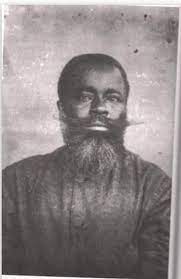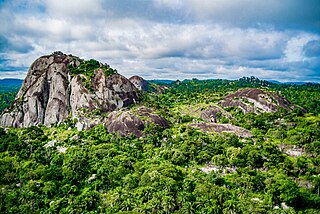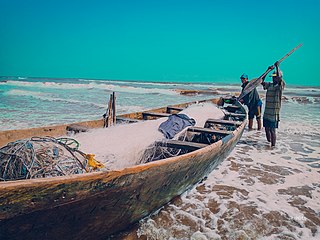Related Research Articles

The Ijaw people, otherwise known as the Ijo people, are an ethnic group found in the Niger Delta in Nigeria, with significant population clusters in Bayelsa, Delta, and Rivers. They are also in Edo, Ondo, and small parts of Akwa Ibom., occupying six Nigerian states. Many are found as migrant fishermen in camps as far west as Sierra Leone, Ghana and as far east as Gabon. As of 2023, Nigeria's Ijaw population is estimated at approximately over 15 million, accounting for around 6.9% of the country's 223 million people, positioning them as the fourth largest ethnic group in Nigeria. The Ijaws are the most populous tribe inhabiting the Niger Delta region, and one of the world's most ancient peoples.

The Niger Delta is the delta of the Niger River sitting directly on the Gulf of Guinea on the Atlantic Ocean in Nigeria. It is located within nine coastal southern Nigerian states, which include: all six states from the South South geopolitical zone, one state (Ondo) from South West geopolitical zone and two states from South East geopolitical zone.
The Defaka are a small ethnic group of south-eastern Nigeria, numbering fewer than a thousand people. They live in the eastern part of the Niger Delta, Rivers State, Bonny District; part of them in the Defaka ward of Nkoroo town in close relationship with the Nkoroo people, and another part of them on the isolated island of Iwoma Nkoro, near Kono. Present neighbours of the Defaka, apart from the Nkoroo people, are: at Iwoma, the Ogoni people, and to the east, the Obolo. The Defaka have a less cordial relationship with these peoples than with the Nkoroo.

Igbo land, east is the indigenous homeland of the Igbo people. It is a cultural and common linguistic region in southeastern Nigeria. Geographically, it is divided into two sections by the: an eastern and western.Its population is characterized by the diverse Igbo culture
The Obolo people, also known as the Andoni or Doni, is an ethnic group in the Niger Delta region of Nigeria. Obolo people are primarily found in Rivers State and Akwa Ibom State. They are also present in the states of Bayelsa, Cross River, Abia, and Enugu.
The Ibani people are of Ijaw ethnic group who live along with the Ijaw speaking people in the Bonny and Opobo areas of Rivers State, Nigeria, on the Atlantic coast. Bonny town is the tribal seat of the Ibani which is located on the bight of Bonny River. Ibani language is spoken predominantly by residents of Bonny and Opobo. Bonny's development was also shaped by the tribe's close interaction with European traders.

Abua (Abuan) is a riverine kingdom which is currently located in the Abua–Odual LGA of Rivers State, Nigeria. It is located 10 miles away from Port Harcourt. The main occupation of resident of Abua includes: fishing, hunting and farming.

The Nembe Kingdom is a traditional state in Niger Delta. It includes the Nembe and Brass Local Government Areas of Bayelsa State, Nigeria. The traditional rulers take the title "Amanyanabo". Today, leadership is split between the Amanyanabos of Ogbolomabiri, Bassambiri, Okpoama, Odioama and Twon Brass.
The Kingdom of Bonny, otherwise known as Grand Bonny, is a traditional state based on the town of Bonny in Rivers State, Nigeria. In the pre-colonial period, it was an important slave trading port, later trading palm oil products. During the 19th century the British became increasingly involved in the internal affairs of the kingdom, in 1886 assuming control under a protectorate treaty. Today the King of Bonny has a largely ceremonial role.

Chief Oko Jumbo was an Ijaw chief of slave descent in the Kingdom of Bonny, a state in the Niger Delta, now part of Rivers State, Nigeria. For many years in the 19th century he was the effective ruler of Bonny. Though not the king in Bonny, and Warribo was the technical head of the Fubara Manilla Pepple House, "Oko Jumbo and Ja Ja were looked upon by every one as being the rulers of Bonny."
George Oruigbiji Pepple, otherwise known as Perekule VII, ruled the Kingdom of Bonny, an independent trading state in the Niger Delta between 30 September 1866 and 14 December 1883, when he was deposed. After the British signed a treaty making the state a protectorate, he was restored on 22 January 1887, ruling until his death.

The Kalabari Kingdom, also called Elem Kalabari, is the independent traditional state of the Kalabari people, an Ijaw ethnic group, in the Niger River Delta. It is recognized as a traditional state in what is now Rivers State, in southern region of Nigeria.
Obolo is a major Cross River language of Nigeria. Obolo is the indigenous name of a community in the eastern Delta of the River Niger, better known as Andoni. Obolo refers to the people, the language as well as the land. It is an agglutinative, an SVO and a tonal language.
John Ikuru (1877–1947) was the son of king Ikuru Efuya, founder of Ikuru Town and Madam Obiringene of Opobo; his mother came from Ekede. He was born in 1877 in Ikuru Town, and had his primary school education at St. Paul's School, Opobo/Nkoro, from 1887 to 1895, and secondary school education at the Wesley Boys’ High School, in Lagos. At that time, Christianity was already sweeping through the entire Western Region of now Nigeria and the Niger Delta, through the evangelistic activities of the Church Missionary Society with Bishop Ajayi Crowther as the pioneer Missionary. So, trained in Lagos, John Ikuru embraced Christianity and became exposed to Christian ethics and philosophy.
Asarama is a riverine city in Andoni, Rivers State, Nigeria. It borders Bori to the north, Nkoro to the east, Ngo to the south, and Bonny and the Kalabari Kingdom to the west.

The South South is one of the six geopolitical zones of Nigeria. It designates both a geographic and political region of the country's eastern coast. It comprises six states – Akwa Ibom, Bayelsa, Cross River, Delta, Edo, and Rivers.
The Unyeada Kingdom, sometimes referred to as "Ayanda" a corrupted version of Unyeada, some literal version interpreted it as "prowess of Edabiri". Unyeada is an ancient riverine settlement (Kingdom) located in western part of Obolo Land, administratively in Andoni Local Government Area of Rivers State, Nigeria. Situated in the south of Ogoni tribe and Kingdom of Bonny to the west and Eastern Obolo to the east. Unyeada territory stretches from Iburubu Sea near the mouth of Andoni River to Okwan Obbu or Imo River.

The Andoni River is one of the many rivers in Rivers State, Nigeria. Andoni River is located between the New Calabar River and Imo River. It is believed to have derived its name from St. Anthony, a European explorer who visited the area in 15th century. The mouth of the river gives way to large mangroves which are an important habitat for aquatic animals.
Agwut-Obolo Town (Alabie) is literally interpreted in Obolo language as. Also, the tribal seat of the Obolo people. Located in Andoni Local Government Area of Rivers State, Nigeria. Agwut-Obolo is an ancient religious centre in the pre-colonial Eastern Niger Delta where the deity of "Yok-OBolo", the National god of the Obolo Nation is situated. Following the exit King Jaja of Opobo and his group from the Kingdom of Bonny in 1869 seeking refuge in Obolo (Andoni) Land, Jaja entered a traditional oath of allegiance to venerate the deity of " Yok-Obolo" at Agwut-Obolo or Alabie as condition of his acceptance into the Obolo territory.
Ijok-irin also known as Unyeada Fishing Festival is an annual cultural and fishing festival of the Obolo people. Ijok-irin means "Fish Fest", in Obolo languages is peculiar to Unyeada Kingdom in Andoni Local Government Area of Rivers State, Nigeria. The festival celebrated during the Summer period in Nigeria between the months of July and August to ushered in the new Fishing season of the Obolo people who are predominantly fishermen. The tradition of migrant fishermen returning home from fishing expedition cross the Gulf of Guinea with their biggest catch to observe the Ijok-irin is till visible with the Unyeada people.
References
- ↑ "NTEOGUILE. V OTUO". www.funmiquadrionline.com. Retrieved 2022-09-29.
- ↑ Enemugwem, JH; Sara, RB (24 June 2009). "Obolo (Andoni) Women in Overseas Trade and Traditional Politics, 1400-1800". African Research Review. 3 (2). African Journals Online (AJOL). doi: 10.4314/afrrev.v3i2.43616 . ISSN 2070-0083.
- ↑ K. Onwuka Dike (1966). Trade and politics in the Niger Delta, 1830–1885: an introduction to the economic and political history of Nigeria.
- ↑ Nkparom, C. Ejituwu (June 1977). The Obolo (Andoni) of the Eastern Niger Delta (Thesis thesis). University of Lagos.
- ↑ "The Andoni-Bonny Treaty of 1846 : a diplomatic curiosity / N. C. Ejituwu". Smithsonian Institution. Retrieved 2022-10-04.
- ↑ "The Andoni-Bonny Treaty of 1846: a diplomatic curiosity". De Gruyter. Retrieved 2022-10-06.
- ↑ Curtin, Philip D. (1964), Curtin, Philip D. (ed.), "The Era of the Niger Expedition", The Image of Africa: British Ideas and Action, 1780–1850, London: Palgrave Macmillan UK, pp. 289–317, doi:10.1007/978-1-349-00539-0_12, ISBN 978-1-349-00539-0 , retrieved 2022-10-06
This article needs additional or more specific categories .(September 2022) |